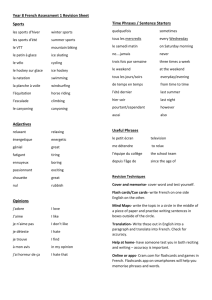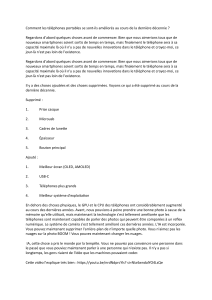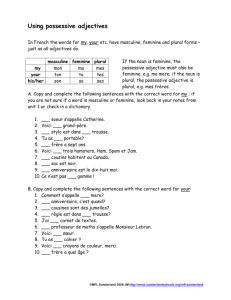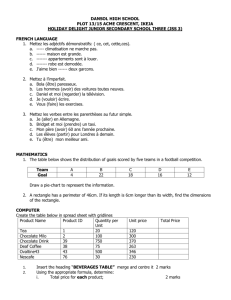Do Nows and Slides - Long Branch Public Schools
advertisement
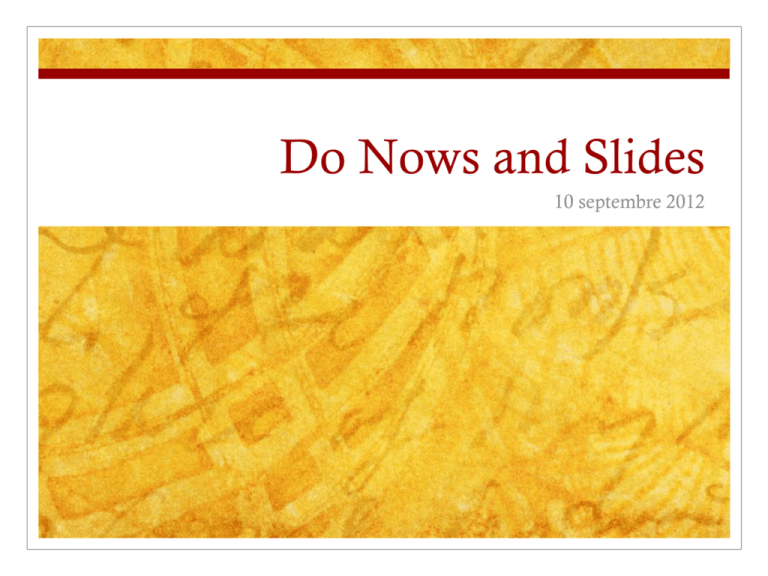
Do Nows and Slides 10 septembre 2012 Do Now – ALL classes 1. Reflect and list the 5 rules of this class. What do you think is one you will struggle with the most? 2. Using your phone or a book dictionary, look up the following English words and define them. These are all words that come from the French. Use www.merriamwebster.com if needed. À la mode À la carte Accoutrements Adieu Amateur Do Now – ALL classes Using your phone or a book dictionary, look up the following English words and define them. These are all words that come from the French. 1. Amour Apparition Annul Ancien régime Aide-de-camp 2. Write a sentence for each word, using the word in the sentence. Do Now – ALL classes In your notebook, write one sentence or phrase that comes to your mind when you think about the following procedures or policies. Write one phrase per procedure: 1. Leaving the classroom clean. When visitors come into the classroom. (e.g. a principal or another teacher). If Ms.Monta is not in and there is a substitute. If Ms.Monta is suddenly ill and has to leave the room. If you finish your work early and have nothing to do. Do Now – ALL classes (Person A) Using your phone or a book dictionary, look up the following English words and define them. These are all words that come from the French. 1. Compatriot Concede Commendation Bistro Bloc 2. (Person B) Write a sentence for each word, using the word in the sentence. Do Now – ALL classes 1. Take a textbook from the back of the classroom. (BonVoyage! – the red book for French 1&2, BonVoyage! – the green book for French 3 –BonVoyage!, the blue book for French 4) 2. Write your name in the book and the school year. 3. Write the textbook number on the top right-hand corner of your index card. 4. Pick a French name. 5. Write your French name on your index card. L’alphabet français A – « ah » I – « ee » Q – « keew » Y – « ee-grek » B – « bay » J – « gee » R – « air » Z – « zed » C – « say » K – « ka » S – « ess » D – « day » L – « ell » T – « tay » E – « euh » M – « em » U – « eeuu » F – « eff » N – « en » V – « vay » G – « jay » O – « oh » W – « doobluh-vay » H – « ahsh » P – « pay » X – « eex » Les accents Accent aigu --- é « ay » enchanté Chloé Accent grave --- è à « eh », « ah » mère chère à la Accent cédille --- ç « ss » garçon français Besançon Accent circonflexe --- ê î être Accent tréma --- ë ï Noël Anaïs Do Now – Period A1/D 1. Return to your groups and continue working on your French rap/song to the alphabet. Do Now – Period C/A2/E2 (Person A) Using your phone or a book dictionary, look up the following English words and define them. These are all words that come from the French. 1. Détente Rapport 2. (Person B) Write a sentence for each word, using the word in the sentence. Do Now – Period C 1. Return to your groups and continue working on your review posters for Chapters 1-3. (It’s what we were doing yesterday)… Do Now – Period E1 1. Work together as a group of 3 to answer the following questions: 1. What is the rule of agreement? (see p.R5, green book) 2. How do we conjugate être and aller? 3. What are the contractions? When do we use these? (see p.R8, green book) 4. What is the passé composé? (p.11, blue book) 5. How do you form the passé composé? 6. What time expressions usually go with the passé composé? 7. How do you form the negative of the passé composé? Storytelling… « Once upon a time » = « Il était une fois » « Then… » = « Ensuite, » « The end » = « Fin » -What classes does your character take? -What does he/she do at school? -sports? -activities? -When does he/she leave for school? « Finally » = « Finalement, enfin » -When does he/she return home? -What is your character like? -How old is your character? -How many brothers and sisters does he/she have? -Does he/she have any pets? Do Now – Period A1/A2/C/D/E2 (Person A) Using your phone or a book dictionary, look up the following English words and define them. These are all words that come from the French. 1. Chic Déjà vu Acclimate 2. (Person B) Write a sentence for each word, using the word in the sentence. Do Now – 24/9/12 (Person A) Using your phone or a book dictionary, look up the following English words and define them. These are all words that come from the French. 1. Concierge Comestible 2. (Person B) Write a sentence for each word, using the word in the sentence. Do Now – 25/9/12 1. Using a French-English dictionary, or your phone, what do the following ingredients mean in French? Work with a partner. 1. Farine 2. Œuf (œufs) 3. Lait 4. Sucre 5. Vanille 6. Sel 7. Beurre Do Now – 25/9/12 1. Using a French-English dictionary, or your phone, what do the following cooking actions mean in English? 1. Battre 2. Mettre 3. Mélanger 4. Verser 5. Remuer 6. Ajouter 7. Faire cuire Comment faire des crêpes? 1. Je bats les œufs avec un fouet. 2. Je mets de la farine. 3. Je mets du sucre. 4. Je mets du sel dans un bol. 5. Je 6. Je les mélange bien. verse les œufs dans le bol. 7. J’ajoute du lait. 8. J’ajoute de la vanille. 9. J’ajoute du beurre. 10.Je mélange la pâte. 11.Je verse la pâte dans une poêle. 12.Je fais cuire la crêpe. 13.Et voilà! Bon appétit! Do Now – 28/9/12 (Person A) Using your phone or a book dictionary, look up the following English words and define them. These are all words that come from the French. 1. Beau Benevolent Complicity 2. (Person B) Write a sentence for each word, using the word in the sentence. Les jours de la semaine « Il y a sept jours Il y a sept jours De la semaine, de la semaine Dimanche lundi mardi mercredi jeudi vendredi Samedi Quel jour est-ce? » Anniversaires C’est quand, ton anniversaire? -Mon anniversaire, c’est le _(date)_ _(mois)_. Do Now – C/A2 1. Start writing your paragraph for « Mon Autobiographie » (see p.10 of today’s handout). 2. Use your textbook for help. Do Now – E1 Travaillez comme un groupe de 3, et répondez aux questions suivantes: 1. Comment on écrit le passé composé avec « être »? (p.27) 2. Comment on conjugue les verbes en –er, avoir et faire? (voir p.R15/R18 du livre vert) 3. Quel est le partitif ? Quand est-ce qu’on l’utilise? 4. Comment on conjugue les verbes « pouvoir », « vouloir » et « prendre » en temps présent? En passé composé? Do Now – C/A2 1. Continue writing for packet « Mon Autobiographie » (see p.38 of today’s handout). 2. Use your textbook for help. Refer to Chapter 4. Do Now – 2/10/12 & 3/10/12 1. What are the corresponding questions that would go with the following answers? Work alone and use your textbook if needed. 1. « ça va bien, merci. » 2. « Aujourd’hui, c’est mardi. » 3. « Demain, c’est mercredi. » 4. « Aujourd’hui, c’est le 2 octobre. » 5. « Mon anniversaire c’est le 10 avril. » 6. « Je m’appelle Didier. » Do Now – E1, 2/10/12 Travaillez comme un groupe de 3, et répondez aux questions suivantes: 1. Discuss in a group what some weather terms are. 2. p. R41: how do you form the passé compose for –ir or – re verbs? 3. p. R43: what are some irregular past participle endings for the past tense? Do Now – E1, 4/10/12 Travaillez comme un groupe de 3, et répondez aux questions suivantes: 1. How do you form reflexive verbs in the present and past tense? (see p.R55 in green book) Do Now – French 1, 4 & 5/10/12 1. Review for your Unit test! 2. Tip: Review class rules and consequences. 3. Review your spelling of vocab. Do Now – French 2, 4 & 5/10/12 1. Open your books to p.181. 2. Complete exercises 3-6.

